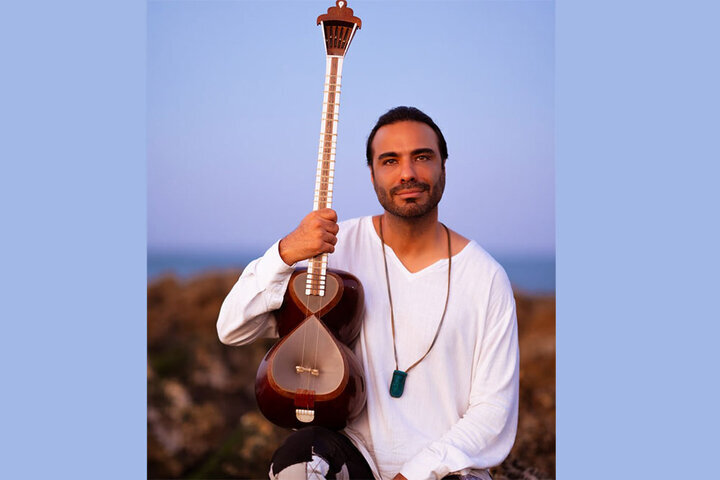Ali Ghamsari to stand for Iran’s territorial integrity through performances on Persian Gulf islands

TEHRAN- Iranian composer and tar virtuoso Ali Ghamsari is set to bring his Iranian Tar Project to the Persian Gulf islands of Abu Musa, Greater Tunb, and Lesser Tunb amid rising geopolitical tensions.
Ghamsari aims to underscore the significance of Iran’s territorial integrity by performing on these three islands, Mehr reported on Monday.
Ghamsari explained that the process of obtaining the necessary permits for this endeavor took approximately one week, and everything has now been coordinated for the project, the report added.
“The Iranian Tar Project is rooted in the people's sentiments and is not affiliated with any specific institution. It operates without any financial backing. The project has emerged as a platform for the voices of the people,” he said.
“Throughout history, negligence and passivity have led to the separation of significant portions of Iranian territory. This has been particularly poignant for those who have tasted the bitter fruits of history and recognize that losing part of Iran—notwithstanding the era in which this occurs—is an affront to the identity of Iranians,” he added.
“I believe no Iranian, whether residing domestically or abroad, finds satisfaction in the fragmentation of their homeland.”
“The Iranian Tar Project aims to be the voice of the public concerning the three islands and their concerns over Iran’s territorial integrity,” he explained.
Ghamsari expressed confidence in the power of independent music to convey the people's message across borders, asserting that music serves as a peaceful medium for sharing their voice with the world.
Regarding artists' responsibilities towards the nation’s territorial integrity, Ghamsari emphasized that today’s artists must go beyond focusing solely on their art; they need to possess historical awareness and contextual understanding.
He also noted that his journey with the Iranian Tar Project has deepened his love for Iran and reinforced his commitment to its territorial boundaries.
Ghamsari, accompanied by two cameramen from Shiraz, will spend two days recording pieces in the three islands, all without financial support from any institution. During this trip, he plans to perform and sing a piece that reflects his love for his homeland.
A tar, setar, divan player, and composer, Ghamsari, 41, began his music education at the Iranian Conservatory of Music and continued his studies in music at the Faculty of Fine Arts, the University of Tehran. He is a Professor of Persian Music Theory at the University of Tehran.
Ghamsari founded the band Sarmad at the age of 18. Afterwards, he established the Hamnavazan-e Hesar Ensemble and the Iranian String Quartet. At the age of 22, he gained fame by composing the album Naghsh-e Khiyal with Homayoun Shajarian. Since then, he has composed over 15 albums, collaborating with several traditional singers such as Alireza Ghorbani, Mohammad Motamedi, and Vahid Taj.
He has performed in many countries, including France, Morocco, Spain, the U.S., the Netherlands, Switzerland, Germany, Sweden, Russia, and Canada.
On October 17, a joint meeting was held in Brussels featuring the leaders of the Gulf Cooperation Council and the European Union. The final statement from this gathering included unfounded claims regarding Iran's territorial integrity, calling on Iran to end its alleged occupation of the three islands—Greater Tunb, Lesser Tunb, and Abu Musa—that are claimed by the United Arab Emirates. The statement asserted that this occupation violates the sovereignty of the UAE and contravenes the principles outlined in the United Nations Charter.
Legal experts indicate that when British colonial rule ended in the region in 1971, the newly established nations, including the UAE and Bahrain, rightfully transferred ownership of the islands to Iran, as all historical records affirm their Iranian heritage.
Following the EU's support for baseless claims regarding the three Persian Gulf islands, a widespread wave of solidarity for these islands has emerged among artists, social media activists, and various segments of society.
SAB/
